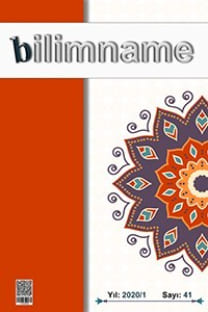Georg Simmel’in Sosyolojik ve Psikolojik Bakış Açılarından Din ve Dindarlık Anlayışı
Georg Simmel, Din, Dindarlık, Modernite, Etkileşim
Georg Simmel’s Sociological and Pyschological Perspective on Religion and Religiosity
___
- Bird, J. (2019). Din sosyolojisi nedir (A. Taştan & M. D. Dereli, Çev.). Lotüs.
- Cipriani, R. (2011). Din sosyolojisi: Tarih ve teoriler (A. Coşkun, Ed.; Muammer Ak, Çev.). Rağbet Yayınları.
- Dirlikyapan, J. Ö. (Ed.). (2011). Georg Simmel: Sosyolog, sanatçı, düşünür. Doğu Batı Yayınları.
- Frisby, D. (2012). Modernlik fragmanları Simmel, Kracauer ve Benjamin’in eserlerinde modernlik teorileri (A. Terzi, Çev.). Metis Yayınları.
- Günay, Ü. (2005). Din sosyolojisi (6. baskı). İnsan Yayınları.
- Haralambos, M., & Heald, R. (1985). Sociology: Themes and pespectives,. Unwin Hyman.
- Jung, W. (2001). Georg Simmel yaşamı/sosyolojisi/felsefesi (D. Özlem, Çev.). Anahtar Kitaplar Yayınevi.
- Laermans, R. (2006). The ambivalence of religiosity and religion: A reading of Georg simmel. Social Compass, 53(4), 479-489.
- Motak, D. (2012). Georg Simmel’s concept of religion and religiosity. Studia Religioliga, 45(2), 109-115.
- Pals, D. L. (2019). Sosyal eylem kuramı: Max Weber. Içinde M. Ulu & Ö. Akdağ (Ed.), & A. Taştan (Çev.), Dokuz Din Kuramı. Kimlik Yayınları.
- Ritzer, G., & Stepnisky, J. (2013). Çağdaş sosyoloji kuramları ve klasik kökleri (I. E. Howison, Çev.). De Ki.
- Sarıbay, A. Y. (2004). Modernitenin ironisi olarak globalleşme. Everest.
- Simmel, G. (1955). A contrubition to the sociology of religion. American Journal of Sociology, 60(55), 1-18.
- Simmel, G. (2009). Bireysellik ve kültür (T. Birkan, Çev.). Metis Yayınları.
- Simmel, G. (2014a). Die religion. Dearsbooks Europeachische Literatur Verlag GmbH.
- Simmel, G. (2014b). Paranın felsefesi (Yavuz Alagon & Öykü Didem Aydın, Çev.). İthaki.
- Simmel, G. (2015). Modern kültürde çatışma (T. Bora, U. Özmakas, N. Kalaycı, & E. Gen, Çev.). İletişim.
- Simmel, G. (2017). Gizliliğin ve gizli toplumların sosyolojisi (İ. Dündar, Çev.). Pinhan Yayıncılık.
- Swatos, W. H., & Kivisto, P. (1998). Georg Simmel. Içinde Encyclopedia of Religion and Society. AltaMira Press.
- Swatos, W. H., & Peter Kivitos. (2016). Hıristiyan bir sosyolog olarak Max Weber (A. Taştan, Çev.). Bilimname, 30(1), 515-538.
- Toktamış, K. (2010). Durkheim’dan Simmel’e toplum bilimine giriş: Bir varmış bir yokmuş. Sosyoloji Dergisi, 3(21), 85-101.
- Vandenberghe, F. (2010). Immanent transcendence in Georg Simmel’s sociology of religion. Journal of Classical Sociology, 10(1), 5-32.
- Wallace, R. A., & Wolf, A. (2004). Çağdaş sosyoloji kuramları (Leyla Elburuz & M. Rami Ayas, Çev.)
- Weber, M. (2009). Protestan ahlâkı ve kapitalizmin ruhu (Zeynep Gürata, Çev.; 6. baskı). Ayraç.
- ISSN: 1304-1878
- Yayın Aralığı: Yılda 2 Sayı
- Başlangıç: 2003
- Yayıncı: -
İran Bankacılık Sistemi Üzerine Bir Araştırma: Sorunlar ve Çözüm Önerileri
Seyfettin ERDOĞAN, Ayfer GEDİKLİ, Mehmet Rıza DERİNDAĞ
Dîvân Edebiyatı’nın Anlaşılmasında Sözlüklerin Rolü ve Bir Metin Sözlüğü İnşa Etmek
Müşteri Perspektifinden Katılım Bankacılığı Üzerine Bir İnceleme: Kocaeli İli Örneği
Seyfettin ERDOĞAN, Ayfer GEDİKLİ, Seda YILDIRIM, Durmuş Çağrı YILDIRIM, Sema YILMAZ GENÇ, Elif HAYKIR HOBİKOĞLU, Fatma ERDOĞAN
Ali er-Rıza Meşhed’i Bağlamında Şiilikte Ölüm, Yas, Türbe ve Ziyaret
Akılcı İnançtan İnançlı Akla: Deizm ve Panteizm Kıskacında Einstein’ın Tanrı Anlayışı
II. Meşrûtiyet Sonrası İstanbul Medreselerinde Talebeye Sunulan İâşe Olanakları
Tefsirde Bid‘at Nitelendirmeleri: Zemahşerî Örneği
MU‘ALLÂKA SAHİBİ MÜSLÜMAN ŞAİR LEBÎD B. RABÎ'A VE DÎVÂNINDAKİ FAHR TEMALI ŞİİRLERİ
Musarrât Hadisi Özelinde Şevkânî’nin Görüşleri Üzerine Bir Değerlendirme
